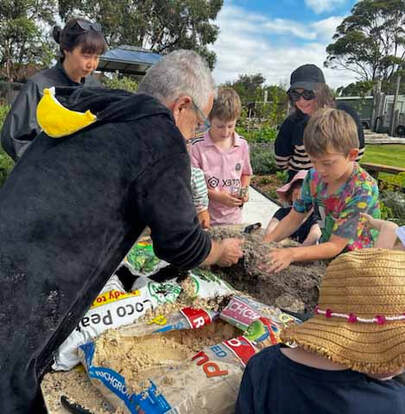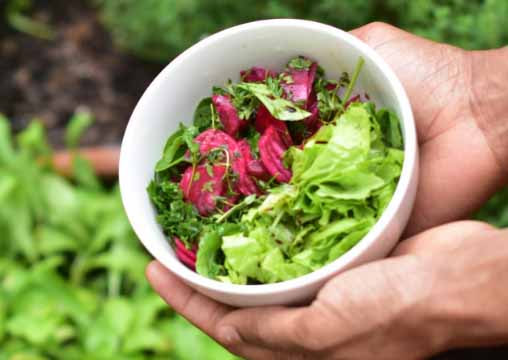 Rick Coleman introduces a new generation to the magic of gardening
Rick Coleman introduces a new generation to the magic of gardening at the Wonthaggi Community Garden. Photos: Sharon Willcox
By Catherine Watson
THERE’S a fairy tale quality to Rick Coleman’s introduction to gardening. Aged 12, he planted a packet of beans in the back yard of his Caulfield family home. He can’t remember why because no one in his working class family was a gardener.
But he watched enchanted as they first sprouted through the soil, then grew a stalk, and produced first flowers and then pods filled with beans.
And that’s the magic of gardening.
THERE’S a fairy tale quality to Rick Coleman’s introduction to gardening. Aged 12, he planted a packet of beans in the back yard of his Caulfield family home. He can’t remember why because no one in his working class family was a gardener.
But he watched enchanted as they first sprouted through the soil, then grew a stalk, and produced first flowers and then pods filled with beans.
And that’s the magic of gardening.
From beans he branched out into tomatoes “because they tasted so good”. He kept expanding, teaching himself and experimenting.
In the late `80s he watched a TV series presented by the Australian permaculture guru Bill Mollison about designing for sustainability and was hooked.
There was no formal permaculture education back then so Rick and his wife set up their own, mediating between the high knowledge educators and ordinary people who just wanted to know how to grow things.
That was over 30 years ago and he’s teaching to this day. Over the next six months he and fellow gardening guru Frances Saunders will be sharing their knowledge in 31 workshops across Bass Coast’s eight community gardens.
In the late `80s he watched a TV series presented by the Australian permaculture guru Bill Mollison about designing for sustainability and was hooked.
There was no formal permaculture education back then so Rick and his wife set up their own, mediating between the high knowledge educators and ordinary people who just wanted to know how to grow things.
That was over 30 years ago and he’s teaching to this day. Over the next six months he and fellow gardening guru Frances Saunders will be sharing their knowledge in 31 workshops across Bass Coast’s eight community gardens.
| The Garden Gems program is presented by Bass Coast Adult Learning in partnership with the council, offering residents an opportunity to learn how to grow their own food while nurturing a deeper connection to their local environment. It’s part of Bass Coast Shire Council’s Sustainable Living Series, developed as part of Bass Coast’s Climate Change Action Plan, which sets a target of zero net emissions for both council operations and the community by 2030. Now, more than ever, Rick says, we need to rethink the way we farm, given the challenges of climate change, erosion, salinity and the fact that agricultural fertilisers are largely made form fossil fuels. “How do we feed the world’s population without those fertilisers? But gardening’s not just about growing food, it’s also about the pleasure of being outside in nature, slowing down, meditation. And for Rick our community gardens fill a special role in a world where two thirds of people describe themselves as lonely most or all of the time. Community gardens are part of the solution, along with initiatives such as repair cafes and. “Humans are social animals. We’re meant to be part of a community.” | Hungry to learn Locals who want to grow their own food have a wealth of learning opportunities ahead over the next six months with 31 workshops to be held at Bass Coast’s eight community gardens:
The workshops cover topics including soil health, composting, organic pest management, and permaculture principles. Visit Garden Gems for information on the workshops and to book your place. |
And while he’s dedicated to teaching people to grow their own food, he clarifies: a permaculturist is not simply a gardener and permaculture is not all about food. It’s about systems.
“It’s a pretty green philosophy. We were the first to talk about ‘Reduce, reuse and recycle’. It’s about water management and energy consumption. Really it’s about joining systems together.”
He gives the example of a home gardener with chooks and a few apple trees. “A chook yard’s generally a pretty barren space because they scratch it up but put the apple trees in the chook yard and you get all sorts of benefits.
“The apple tree offers shade to the chooks and shelter when a hawk is circling. The chooks weed around the tree, they drop a lot of shit that fertilises the tree. After the fruit’s been picked they clean up the fallen fruit and break the codling moth cycle.
“The systems do the work and that’s the difference between permaculture and farming.”
“It’s a pretty green philosophy. We were the first to talk about ‘Reduce, reuse and recycle’. It’s about water management and energy consumption. Really it’s about joining systems together.”
He gives the example of a home gardener with chooks and a few apple trees. “A chook yard’s generally a pretty barren space because they scratch it up but put the apple trees in the chook yard and you get all sorts of benefits.
“The apple tree offers shade to the chooks and shelter when a hawk is circling. The chooks weed around the tree, they drop a lot of shit that fertilises the tree. After the fruit’s been picked they clean up the fallen fruit and break the codling moth cycle.
“The systems do the work and that’s the difference between permaculture and farming.”
